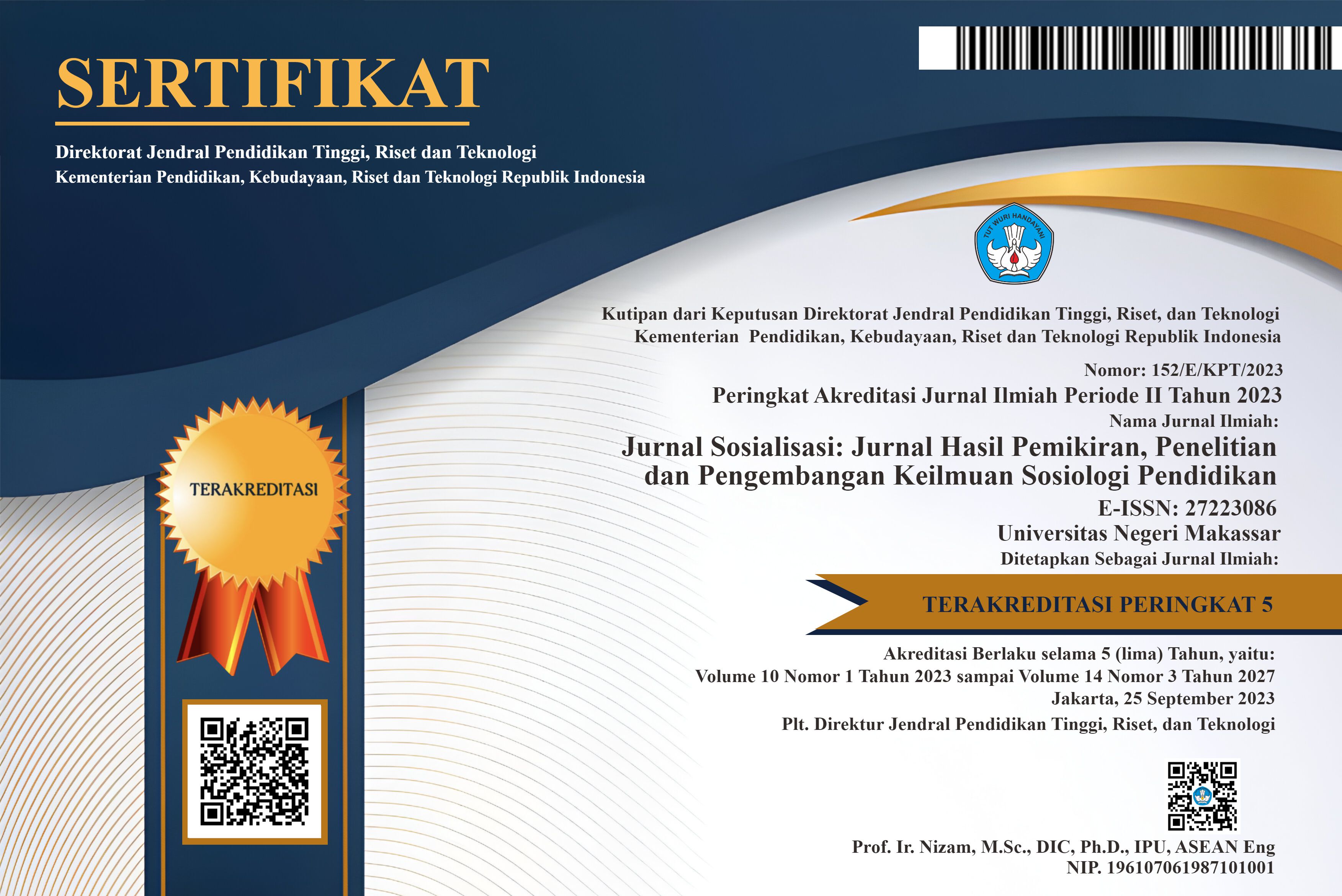Reinventing the Theatre Curriculum to Address Contemporary Development Needs and Job Alignment in Nigeria.
(1) Department of Theatre and Media Studies University of Calabar
(*) Corresponding Author
DOI: https://doi.org/10.26858/sosialisasi.v1i1.22564
Abstract
Keywords
Full Text:
PDFReferences
Ambrose Alli University. (2015). Faculty of ArtsHandbook. 7th Edition, 2015-2017.
Amkpa, A. (2004). Theatre and postcolonial desires. Routledge.
Andrew, E. H. (2002). Integrating World Civilizations Through Multi-Polar Communications. Ndunode: Calabar Journal of the Humanities, 3(2)
Andrew, E. H. (2006). Contemporary dimensions of interaction between art and technology: implications for stage and media designs. Global Journal of Humanities, 5(1), 31-34.
Andrew, E. H. (2010). Visual and Theatrical Elements in Two Emerging Nigerian Carnivals. Critical Interventions, 4(1), 62-76.
Andrew, E. H. (2010). Visual and Theatrical Elements in Two Emerging Nigerian Carnivals. Critical Interventions, 4(1), 62-76.
Andrew, E. H., Agibe, C., & Eneh, E. (2014). Technical Improvisations for Carnival Float Robotics: A Study of Passion 4 Designs in Carnival Calabar (2008–2012). Management Science and Engineering, 8(2), 21-32.
Andrew-Essien, E. H. (2018). Evolving New Management Plans for Cultural Tourism in the Face of the Global Security Crises: The Nigerian Perspective. Calabar Journal of Liberal Studies-Cajolis, 20(1), 82-96.
Ayeni, Q. O., & Odey, V. E. (2016). Theatre and social criticism in African literature: socio-cultural consciousness in Alachi’s “Dilemma of Oko”. Lwati: A Journal of Contemporary Research, 13(3), 62-74.
Betiang, L. (2010). Theatre of rural empowerment: The example of living earth Nigeria Foundation's community theatre initiative in Cross River State, Nigeria. Research in Drama Education: The Journal of Applied Theatre and Performance, 15(1), 59-78.
Brockett, O. G. (1992). The Theatre: An Introduction. 4th Edition. New York: Harcourt, Brace and Jovanovich.
Crow, B., & Banfield, C. (1996). An introduction to post-colonial theatre. Cambridge University Press.
Department of Creative Arts, University of Lagos. www.unilag.edu.ng
Department of Dramatic Arts Handbook (2008). Obafemi Awolowo University.
Department of Theatre Arts and Music, Lagos State University (www.lasu.edu.ng).
Department of Theatre Arts. (n.d). Benue State University. (www.bsum.edu.ng).
Department of Theatre Arts. (2021). University of Maiduguri. Academic Programme.
Department of Theatre, Film and Carnival Studies, University of Calabar. Undergraduate Programmes Students’ Handbook, 2018.
Enendu, L. O. M. (2002). The Development of Theatre Venues and Theatre Architecture in Nigeria and Implications on Theatre Design. Design History in Nigeria: Essays in Honour of Demas Nwoko. Abuja: National Gallery of Arts.
Etherton, M. (2012). The Development of African Drama. Zaria: Tamaza Publishing.
Hughes, H. (2000). Arts, Entertainment and Tourism. Oxford: Butterworth Heinemann.
Isijola, O. B. (2018). Theatre Practice And Economic Recession In Nigeria: The Jos Repertory Theatre (Jrt) Example. Nigerian Theatre Journal, 18(2), 95.
Mbum, P. A., Oben, B., & Ighoteguonor, E. G. (2014). Empirical study on global marketing flows and Nigerian economic growth perspective. Journal of International Business and Economics, 2(4), 125-162.
National Universities Commission. (2011). Benchmark Minimum Academic Standards for Postgraduate Programmes in Arts in Nigerian Universities. November.
Nzuanke, S. F., & Chinaka, U. N. V. (2018). Technology and translation: the impact of recent technology tools on professional translation. Lwati: A Journal of Contemporary Research, 15(3), 75-96.
Nzuanke, S. F., & Chinaka, U. N. V. Knowledge and Use of Computer-Assisted Translation Tools on Professional Translation in Nigeria.
Oben, B., & Ajimase, A. E. (2011). Africa's perception of the world: À commentary on Elérius John's La tortue. AGORA-Journal of Foreign Language Studies, 3-167.
Oben, B., & Egege, L. U. (2018). Conflit idéologique, calvaire de la maternité ou le dilemme de la femme africaine dans un monde postmoderne? Réflexions sur vie de femme vie de sang d. Azaratou Baboni’, Journal of Humanities and Cultures Studies R&D, 4(5), 1-10.
Oben, B., & Eyang, A. E. (2015). From Quest to Self Discovery–The Return of The Prodigal Son in Search of His Identity: A Reflectionon Etienne Goyemide's Le Silence De La Foret. Lwati: A Journal of Contemporary Research, 13(1), 75-88.
Oben, B., Ajimase, A., & Umukoro, G. (2011). A socio-psychological reading of Camara Layé's The radiance of the king. Calabar Journal of Liberal Studies, 15(1), 222-236.
Odey, E. A., & Agi, R. (2015). The Trend of Insurgence in Nigeria: A Rising Challenge to Religious Leaders. World Educators Forum, 3,2.
Omitola, A. (2017). Tourism and sustainable development in Nigeria: Attractions and limitations of carnivals and festivals. Journal of Sustainable Development in Africa, 1(2), 122-132.
The Department of Performing Arts. (2016). Akwa Ibom State University.Students’ Information Handbook. First Edition.
Theatre Arts Department, Nnamdi Azikiwe University, Awka. “Theatre Arts Course Descriptions”, (www.arts.unizik.edu.ng).
Umukoro, G. M., Odey, V. E., & Ndifon, M. M. (2020). Immigration, Otherness, Economic mobility and social inclusion in the homeland. International Journal of Social Sciences and Education, 1(1).
Umukoro, G. M., Odey, V. E., & Yta, E. M. (2020). The effect of pandemic on homebased tourism: post Covid-19. International Journal of Humanities and Innovation (IJHI), 3(3), 115-120.
Umukoro, G. M., Odey, V. E., & Yta, E. M. (2020). Tourism Site Infrastructure, Visitor Patronage and Calabar Metropolis. Jurnal Office, 6(2), 97-102.
Article Metrics
Abstract view : 170 times | PDF view : 17 timesRefbacks
- There are currently no refbacks.

This work is licensed under a Creative Commons Attribution 4.0 International License.


































